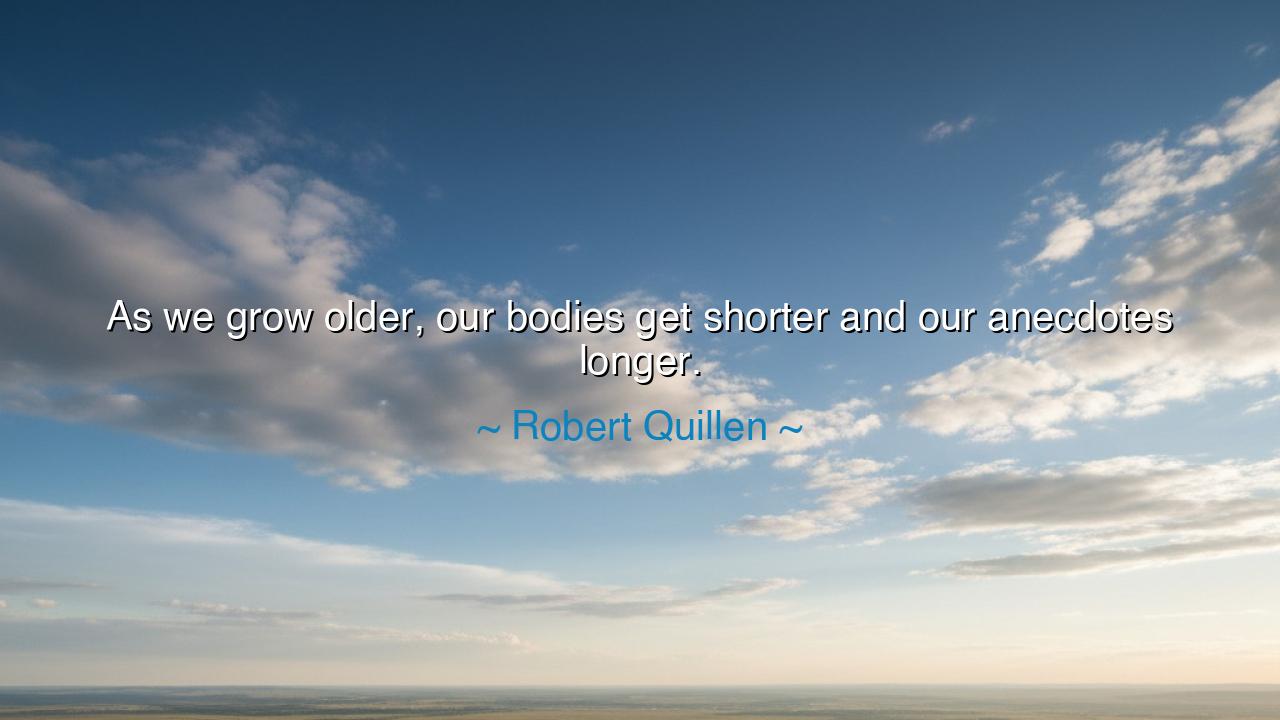
As we grow older, our bodies get shorter and our anecdotes






"As we grow older, our bodies get shorter and our anecdotes longer." These words from Robert Quillen resonate with a deep and poetic truth about the human condition. As time passes, we are bound to witness the decline of our bodies—our strength wanes, our movements slow, and the vitality of youth begins to fade. Yet, in the face of this inevitable process, there is something that grows—our stories, our experiences, and the wisdom we have acquired over the years. What once may have been a brief tale or a fleeting moment of recollection now becomes a longer, more intricate narrative, reflecting the richness of our lives. And so, Quillen's words encapsulate the profound paradox of aging: though the body diminishes, the spirit, the memory, and the stories of our lives grow in strength and magnitude.
In the early years of life, we rush through days, caught in the energy of our youth, rarely pausing to reflect. The stories we tell are often short, focused on the moment, and filled with the exuberance of a life still unfolding. But as we grow older, we become more reflective. The body, which once surged forward with speed and grace, begins to slow, leaving the mind and heart to carry the weight of the past. The tales of our youth, now transformed by the lens of time, expand into longer anecdotes that carry with them the lessons learned, the struggles faced, and the wisdom gained through years of living. The body may grow shorter in its reach, but the richness of our experience continues to extend, echoing through the stories we share.
Consider the life of Mahatma Gandhi, who, in his later years, became a repository of stories that encapsulated the entirety of his life's work. Gandhi, in his old age, no longer had the physical strength to lead revolutions or march across vast distances as he once did, yet he had a wealth of anecdotes, tales of courage, suffering, and triumph, which he shared with the world. His stories, full of wisdom, became his new form of leadership, his way of inspiring others. Though his body had weakened, his mind remained sharp, and his stories grew longer, richer, and more profound, illuminating the path for future generations. The aging process did not diminish his influence; rather, it deepened his narrative, turning his life into a living testament to perseverance, nonviolence, and truth.
This is the essence of Quillen’s quote: aging does not only bring decline; it also brings growth—growth in the form of memory, wisdom, and the narratives that shape who we are. The older we become, the more we find ourselves recounting the journeys we have undertaken, the lessons we have learned, and the changes we have witnessed in the world around us. Our anecdotes are no longer just stories but powerful messages for those who come after us, offering a sense of perspective and understanding that only time can provide. It is through the telling of these stories that we remain alive in the hearts and minds of others, continuing to inspire long after our physical bodies have shrunk.
The example of Nelson Mandela provides another illuminating reflection of Quillen's words. In his later years, Mandela’s body grew frail, yet his anecdotes—the stories of his time in prison, his fight against apartheid, and his vision for a united South Africa—grew ever more powerful. His words, steeped in the hardships of his life, became the catalyst for change across generations. Though he could no longer walk the streets as he once did, his stories transcended his physicality, taking on a life of their own. Mandela’s ability to recount his journey, to turn his suffering into wisdom, is the very embodiment of Quillen’s notion that as our bodies grow shorter, our anecdotes grow longer.
In the grand tradition of the ancients, stories have always been the means by which we pass on knowledge, wisdom, and experience. The elders of ancient tribes, who could no longer hunt or travel as they once did, remained vital members of society because they were the keepers of stories—tales of their ancestors, of great victories and tragic defeats. These stories shaped the community, offering guidance on how to live, how to fight, and how to endure. The elders, through the power of their words, transformed the process of aging into a celebration of wisdom, ensuring that their legacy lived on in the stories they told.
Thus, the lesson we can take from Quillen’s quote is this: as our bodies change, it is essential to cultivate our anecdotes—our stories and experiences. Let us not become discouraged by the inevitable decline of our physical form, for the true richness of life lies not in how long we can run or how far we can stretch, but in the tales we tell, the lessons we pass on, and the wisdom we impart to those who follow us. Just as the ancients turned their aging into strength through stories, so too can we. As we grow older, let us focus not on the shrinking of our bodies but on the ever-expanding legacy of our anecdotes—and in doing so, we will continue to live, long after the years have passed.






AAdministratorAdministrator
Welcome, honored guests. Please leave a comment, we will respond soon